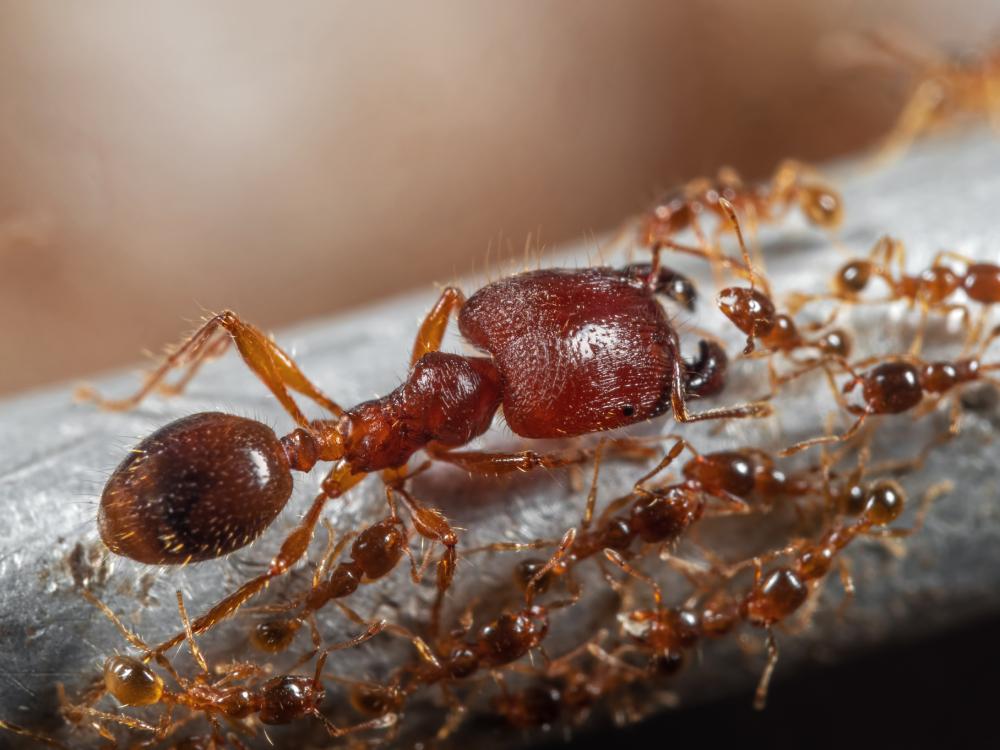
You’ve likely come upon an ant with a noticeably large head before and thought, “Why is that ant’s head so huge?” It wasn’t just an anomaly in the ant world—chances are, you spotted a big-headed ant belonging to one of several species within the genus Pheidole. Read on to find out if they’re a health concern or just a nuisance in your home.
What are big-headed ants? Are they just full of themselves?
Big-headed ants are common across the US, creating colonies and searching for food to feed their queen and offspring. There are two types of worker ants: major workers and minor workers. Only the major workers leave the colony, foraging far and wide for food. Minor workers stay closer to home, caring for the queen and the colony.
Where do big-headed ants live?
Big-headed ants create their colonies outdoors, preferring the shelter of fallen trees, logs, rocks, or debris that is undisturbed. These critters are omnivores and will not hesitate to eat other insects in your yard.
When they venture into your home in search of food, big-headed ants prefer protein-rich things like grease, meat, seeds, and nuts. Unless your home has the perfect conditions to support a colony, it’s unlikely that you’ll find many in your home, but they will happily trundle indoors to feast and bring food back to their colony outside.
Why am I finding big-headed ants in my home?
Big-headed ants are resourceful, entering your home through the smallest cracks in windows, doors, and foundations. Once they smell food, they’ll be on a mission to find a path inside.
Ants leave pheromone trails when searching for food so that they can find their way back to their colonies, but also so they can find their way back to your kitchen again if it proves to be a fruitful place to feed. Even the tiniest bit of food can attract a big-headed ant, so if there are leftovers on the counter or crumbs on your floors, you might be putting out a welcome mat for them.
Are big-headed ants harmful?
Big-headed ants are generally harmless and more of a nuisance in your home than a disease-spreading pest like cockroaches or rodents. Although big-headed ants can bite, they typically save their energy for gathering food.
How do I get rid of big-headed ants in my house?
First, ensure that any food items are sealed or in the refrigerator. That means no cookie jars, candy bowls, or snacks left out on the counter. Being diligent about wiping countertops and vacuuming crumbs from the floor is also important since ants will gravitate to even a small spill or crumb.
Second, thoroughly inspect the outside of your home, checking for gaps or cracks where ants or any other critters could be sneaking in. Sealing up gaps around doors or windows is also essential, even on upper levels—ants are excellent climbers, capable of scaling rough and smooth surfaces.
If you still see ants in your home, it’s time to call your local Hawx Pest Control pros.
How do I get rid of big-headed ants in my yard?
One of the main reasons you may be finding big-headed ants in your house is the presence of a colony nearby. Ants like to establish colonies in loose soil, in sheltered areas inside fallen trees, or under rocks and logs. Take some time to tidy up your yard and keep an eye out for big-headed ant colonies.
In urban areas, fighting off big-headed ants can be challenging because you can only control what happens on your property. If you suspect ants are coming from your neighbor’s yard, do your best to take away any incentives that big-headed ants would have to enter your home—the fewer temptations, the fewer reasons for them to be there.
Ants in your home can certainly be an annoyance. If you need the pros, give your local Hawx Pest Control team a call. Pest control for ants is an ongoing concern, and our experts implement a threefold system, using the best equipment and products to manage the ant population inside or outside your house.
RELATED POSTS




